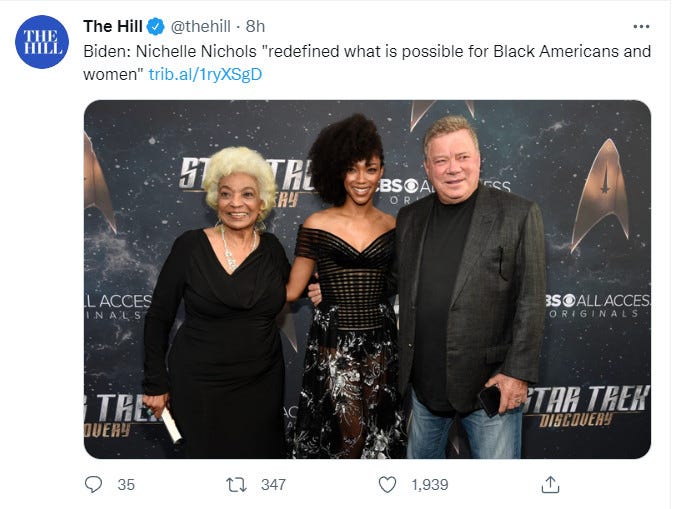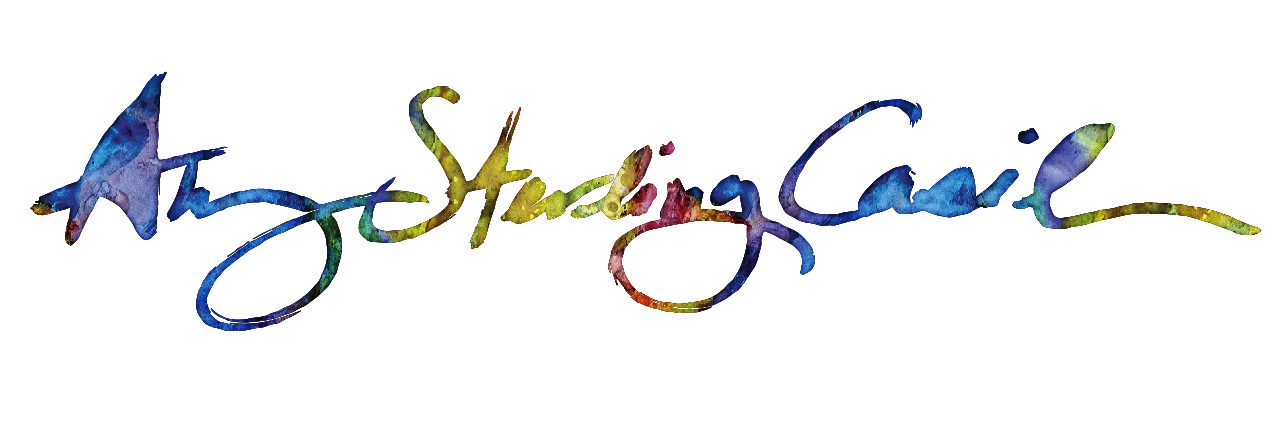Like so many other people, I was saddened to hear that Nichelle Nichols, one of the most positive, beloved actors I can think of, had died.
I’ve already written about how I had the privilege and honor of visiting for a short time with three “Ladies of Star Trek,” including my childhood idol and role model, Nichelle Nichols/“Lt. Uhura” from the original Star Trek series.
Idols and role models aren’t always the same thing. For a time when I was in elementary school, I would come home from school and watch Star Trek before heading to softball practice, doing yard chores, or pretending I was a wilderness explorer. Most people would have said I was a tomboy, but I liked my Barbie dolls a lot — when I wasn’t operating on them to see how their legs worked.
I’m sitting here, tears streaming down my cheeks remembering how I would model my posture gracefully after Uhura’s motions.
How I wanted beautiful nails like hers. Shining brown eyes, a soft yet strong voice, beautiful hair.
I wanted to be confident, sophisticated, strong, and wise: like Uhura.
I just loved her so much.
It never crossed my 10-year-old mind that I wasn’t supposed to idolize Nichelle Nichols and Uhura this way because she was Black.
And I was Caucasian.
Years later, I read how Nichelle had wanted to quit Star Trek to pursue other performing opportunities, but Dr. Martin Luther King, Jr. told her that her role was too important, and that she needed to continue. She agreed, and Lt. Uhura went on to be a role model for countless others.
I’ve written before about how when many noted women die, their obituaries refer primarily to their external appearance or their marital status. In Nichelle’s case, she was such an elegant and flawless performer, and her influence was so great, that most of her obituaries are more respectful, in-depth, and detailed.
But they still focus only on her status, similar to Jackie Robinson in Major League Baseball, as the first Black American to take a leading role in an endeavor formerly restricted only to “white” Americans. Lt. Uhura on the original Star Trek was the first leading role in a U.S. television series for a Black American woman. Also at this time, Bill Cosby was on TV in his own show, after starring in I Spy.
When I was young, the almost all-white television experience of the 1950s and early 1960s was changing. Today, the official reports and obituaries about Nichelle emphasize her historic role.
But the thing is, Nichelle was a gifted performer, not just on television, but also theater, as a dancer and singer.
Because she was Black and breaking these barriers, Nichelle got so much more attention than others. The picture above also shows the basketweave blonde hair of Grace Whitney, Yeoman Janice Rand on the original Star Trek. This young blonde woman also starred in a few episodes, but I didn’t idolize her. She was just like many other blonde actresses of the day— I was even the flower girl in Susan Anton’s wedding. I had seen and been around more than a few blonde, blue-eyed female entertainers.
It’s true: just because she was Black, Nichelle Nichols drew attention.
But the inner spirit of Nichelle Nichols — her wonderful heart and soul — gave her performances their unique, spellbinding quality and kept everyone’s attention.
There is a great difficulty on the part of more privileged people to understand what it is that others who are less-privileged experience and feel.
Yes, I think I am a little bit fortunate in that it’s not as difficult for me to put myself in others’ shoes as it seems to be for so many others.

See, I’m a writer. I didn’t like this statement above when I first saw it. The statement implies that it was impossible for a Black woman to star on a network TV show, or for women in general to be part of the space program. None of those things were ever impossible: racist people were just blocking people from participating.
But now when I see it again? I guess I do find the statement acceptable, if not fully reflective of who Nichelle really was. Nichelle Nichols was so much more than just the first Black American woman to star in a national television show. She was so much more than a woman who spoke with young people and inspired them to join the U.S. space program.
That long-ago day when I had one of my only decent book signings and the “Ladies of Star Trek” were sitting nearby —
Nichelle is the one who saw me sitting alone with no people coming for autographs, and stood and gestured for me to come over and talk with them. If she hadn’t, I would never had experienced those treasured moments with her, Grace Whitney (Yeoman Janice Rand), and Marina Sirtis (Deanna Troi).
I only spent a few minutes with them but I could feel her life force, and it was an entirely beautiful one.
That life force came across in all of her roles, not just as Uhura on Star Trek.
I’ve been thinking a lot about cultural admiration, not appropriation.
As an adult, I can understand how Nichelle felt when she wanted to move on from Star Trek for her own career, and how Dr. Martin Luther King, Jr. asked her to continue — and she agreed. At the time, as a child, I didn’t have the context to understand why Uhura’s role was so important, and why he would have made that request.
As a selfish young child, I would just have wanted my favorite actress to continue to play my favorite part on one of my favorite shows.
And, I watched Star Trek reruns, like countless millions of others. It wasn’t just the original Star Trek show airing at night, which my cousins were old enough to stay up to watch, but I wasn’t.
I think Nichelle Nichols influenced millions of other young women (and men) not as a figurehead or a ground-breaker but because of how unique and beautiful an individual she was.
Poised, elegant, strong, wise, beautiful, resourceful, self-confident.
Who wouldn’t want to grow up to be someone like that?

Leave a Reply